by Heather Plett | Oct 17, 2012 | circle, writing
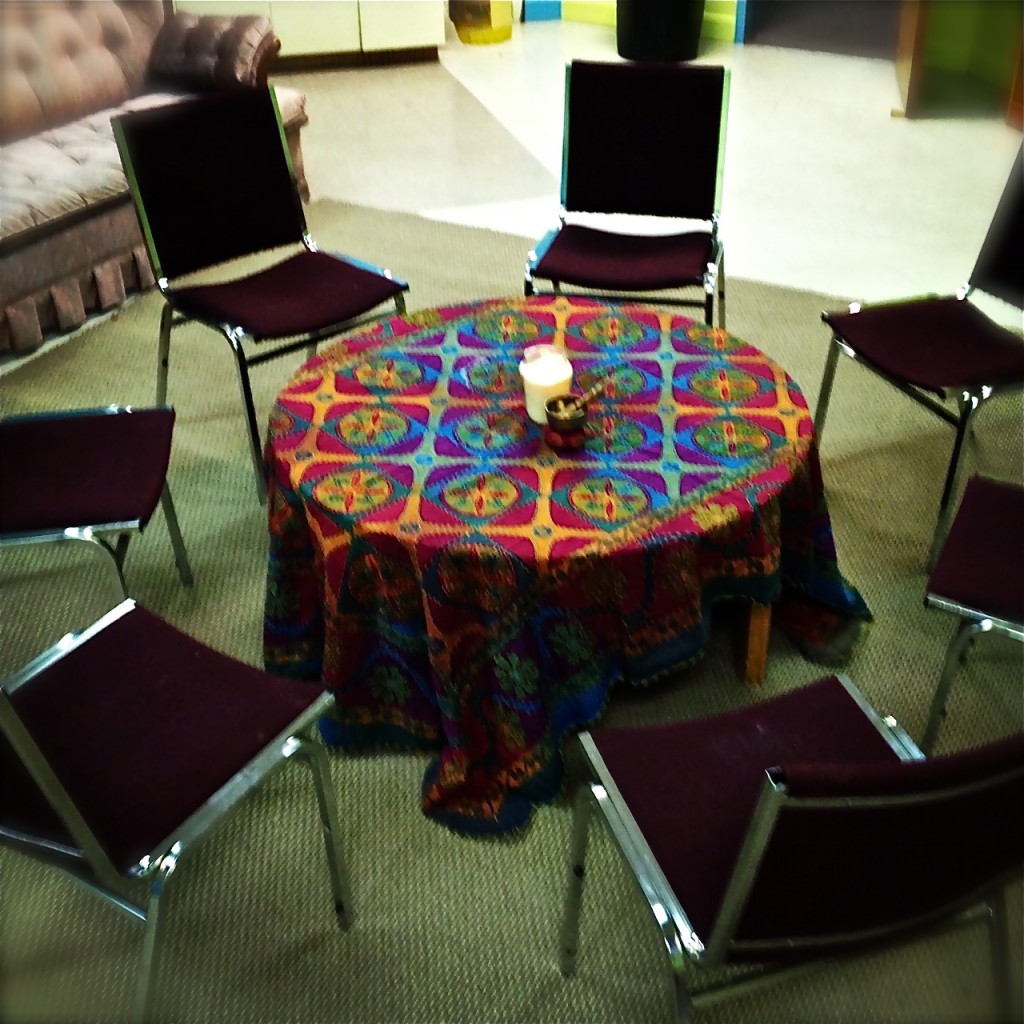
It’s another Tuesday night and I prepare once again for my small circle of writers. I arrive early and place the low round table in the centre, covered with the colourful tapestry that comes with me to every workshop. Like the threads of the tapestry, many stories will be woven together tonight.
At the centre of the table is always the candle – the warmth that holds us together. Next to it is my Tibetan singing bowl and whatever talking piece has been selected for this evening’s sharing time. Sometimes the participants bring talking pieces that are meaningful to them. Tonight one woman has brought a beautiful black polished stone, adorned with a dragonfly mosaic. “It represents transformation,” she says.
The women (and occasionally men) settle into their chairs and I welcome them with the ringing of the bell. We sit quietly, focusing on our breath as we wait for the end of the rich tone. After the bell, a centring piece is read – a poem by Mary Oliver or a blessing by John O’Donohue. Then the talking piece is passed, and we share the details of how our weeks have gone – from the mundane to the profound. None of this is about writing, but it’s important nonetheless. Our writing voices emerge out of our personal stories and we know that those stories will feel more safe in a circle of people we trust. Only three weeks in, and we are already bonded, sharing increasingly more vulnerable stories with each other.
Next they begin to share the pieces they’ve been working on throughout the week. “I didn’t have much time,” one apologizes, or “it’s not very polished,” says another, or “it’s nothing great,” says yet another, and yet each time they share, I marvel at how profound and beautiful their simple offerings are. This week, they’ve written a dialogue between the voices in their heads – the one that wants something new and the one that’s resisting. Their individuality and shy dreams shine through their pieces.
Tonight we are exploring what voice means – both our own voices and the voices of those people and creatures we want to bring into our writing. I pull out a set of cards depicting forest creatures – the Elementals designed by my intuitive friend Thomas – and they are invited to write in the voice of the creature they see on the cards they select.
As they write, I boil water for tea. Tea goes well with writing and storytelling. There is silence in the room, each person wandering away from the space for awhile, imagining themselves in the forest with a mesmerizing creature that has a message meant just for them.
They share their pieces, surprised by how much wisdom flows out of them. Before long, the conversation has veered far away from writing. We’re talking about our connections to the earth, our secret longings, our hidden shame, our deepest fears. I say very little and offer only little guideposts to help them know the conversation is good and true and heading in the direction it’s meant to head in. In this moment, I am not teacher but host. It is their wisdom that is emerging – their truth, their gifts. I am here simply to help them unleash it.
As I listen, I find myself grinning at the beauty of this circle and all of the others like this that I have had the pleasure of hosting. Each offering I make, the right people show up, the right voices emerge, and the right truth is spoken. Always, the people that are drawn to what I offer are open-hearted and open-minded. They come because they want to learn and grow. They come because they are beginning to find the courage to explore and share their own stories. I am always fascinated by how unique and wise each person is.
Often, early in our time together, there is resistance in one or two of them, but usually by the end, the resistance has softened and openness has taken its place. Only once has someone stopped coming because she wasn’t prepare to process the depth of feelings that surfaced for her in the circle.
The evening ends quickly and they are given their next assignment. This week, they will write about place. They’ll find a place that feels meaningful to them and they’ll find the unique quality and voice of that place. I have no doubt that once again they’ll be surprised at what shows up in their writing.
One more time, the talking piece is passed, and we share what we learned or what intentions we wish to set for the week ahead. The bell is wrung one more time, and we begin to leave the circle and depart for our various homes.
I drive home, taking the long way through the park, savouring the magic of the night. This is my greatest dream coming true, circle by circle, story by story. I am honoured and blessed to be the host of so much goodness.
by Heather Plett | Oct 10, 2012 | Uncategorized
Every few months, I like to make a vision board. It’s my feminine, right-brained version of strategic planning. Instead of filling a page with boxes and goals and strategies, I fill it with images and words plucked from magazines that I feel drawn to and that my intuition tells me have something to do with the direction my heart is heading.
I haven’t made a vision board in a long time. One day in August, I sat with my mom in an oncologist’s office and heard the words “cancer spreading” and “six to twelve months to live”, and since then, my vision is too narrow for a vision board. The only thing I can see in my future is “fatherless, motherless daughter” and that’s hard to pluck from a magazine.
Since then, my focus and energy have been limited, at best. Not only am I dealing with grief, but I’m dealing with a pretty serious lack of paying work because I just don’t have what it takes to drum it up right now. I’m looking for part time work that will bring in some income while I deal with whatever the future holds.
Where’s the “vision” in all that? Pay the bills, feed the kids, sit with Mom, worry about money, drive the kids to where they need to go, visit Mom again… that’s about all I can muster these days.
This week, though, my friend Segun dropped off a bag of old maps, and suddenly I found myself missing my paints and scissors and Mod podge. Something about those old maps made me want to create again.
Tearing up old maps can feel surprisingly cathartic when there’s no roadmap for the journey you’re traveling along. I tore and I placed and I glued. I shredded roads and lined them up with wasteland. I tore up countries and provinces. I cut lakes in half. I destroyed international borders. I had no idea what was emerging, but it felt good to destroy and then to begin to create again.
After the page was full of torn map pieces, I turned to my stack of old magazines. Not a lot in them inspired me. I wasn’t dreaming of parties or feasts or published books or beautiful retreats. All of that felt foreign and far away.
Suddenly I realized that instead of making a “vision board”, I was making a “lack of vision board”. Something about that acknowledgement felt like a release. I didn’t have to find anything in the images. I didn’t need it to be anything. Maybe just tearing up map pieces was enough for now. Maybe it was the journey and not the destination that I needed.
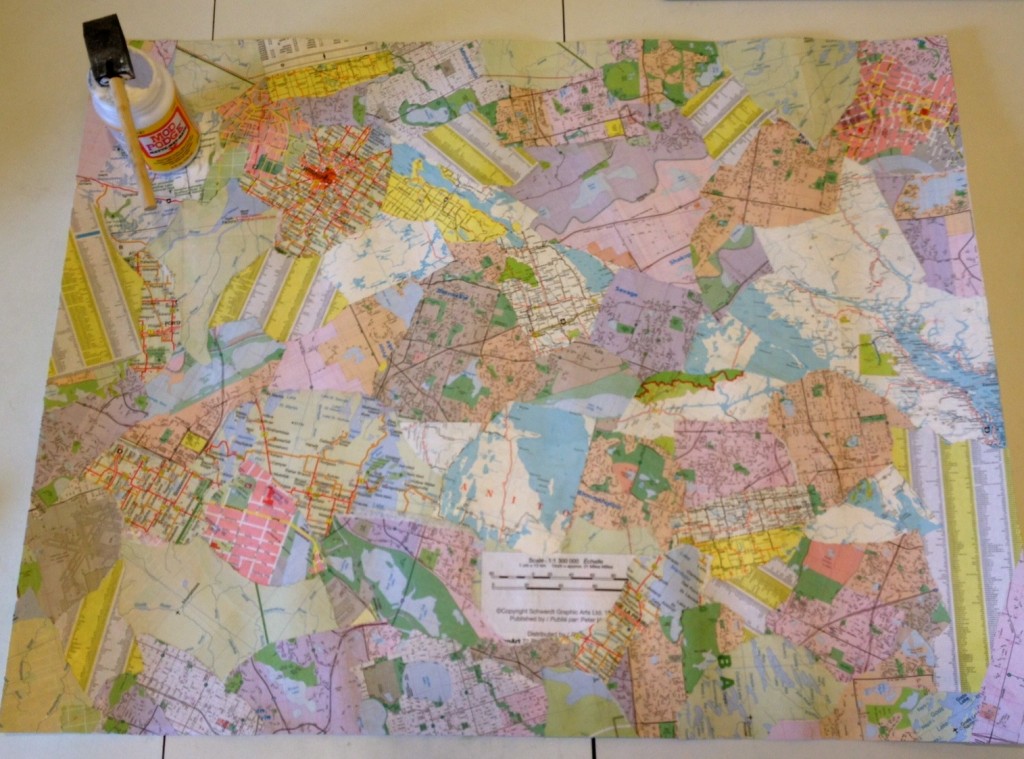
I left it alone for awhile. I made a pot of soup and sat down to stare out the window while I ate.
Eventually, I came back to it, knowing I wanted to add something more. Paint? Images? I had no idea. I was listless and unfocused, the way I spend much of my time these days.
A few images and words caught my attention. Images related to being on a journey – a man feeding his donkey, a couple in a canoe, a woman on a bicycle, the path of a turtle returning to the sea, a woman carrying her basket on her head. And then there were several images related to the wild – elephants, a butterfly, an eagle, balanced rocks in the tundra. The words were similar – bleak, restless, and a little wild. “Foreigner in their own land.” “The first condition of understanding a foreign country is to smell it.” “Cry of the wild.” “Life-giving death.”
I glued the pieces on. They were sparse on my huge paper, but I didn’t feel like adding more. I didn’t feel like overlapping images the way I usually do. I didn’t want them to touch.
I grabbed my paint. There was too much clarity on the board – I needed it to be muddier. I started adding layers of ochre, orange, and brown – first a wash, then random brushstrokes.
Suddenly I realized that the brushstrokes weren’t random at all. I was creating a series of intertwining paths connecting the images and words. It was all about a journey, but this was no clear map-driven journey. It was random and chaotic, with detours and bumps and unexpected curves. A map to nowhere and everywhere, all at once.
To the paths, I added even more detours – spirals jutting out at random intervals – the pauses along the journey where one must take a deeper spiritual journey before returning to the path.
When the paths were finished, I added the words that came to me: “Pilgrim, there is no path. The path is made by walking.” (from a poem by Antonio Machado) And at the bottom, I added a note just for me. “Walk on.”
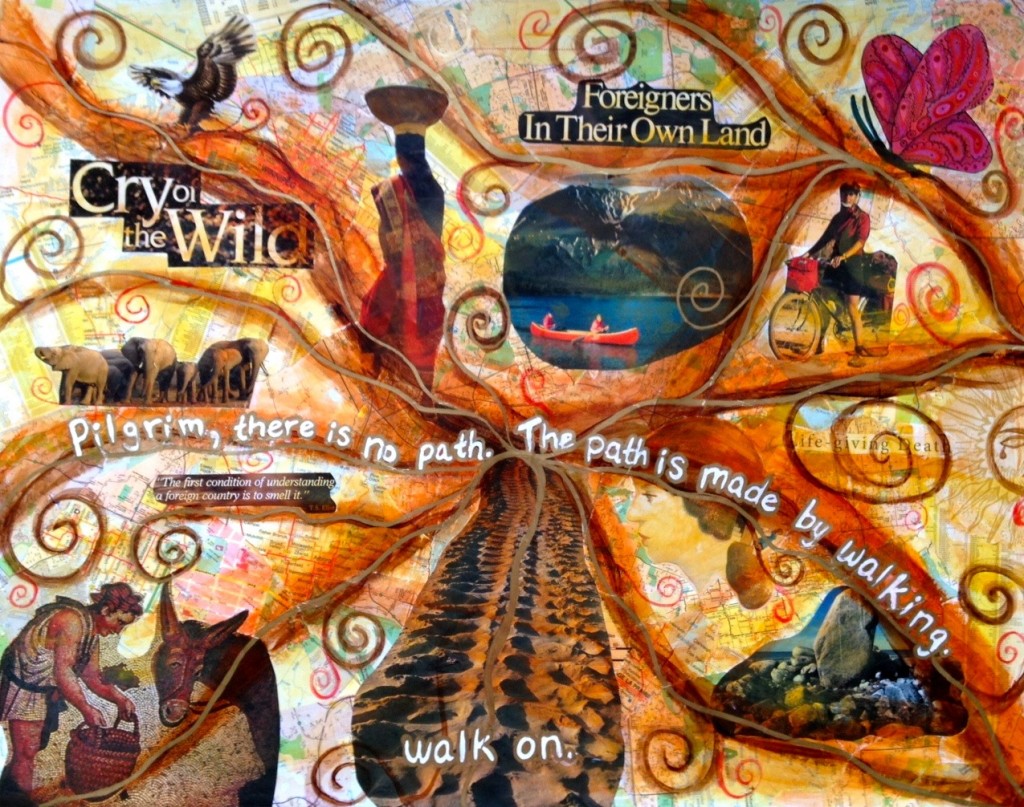
I am very fond of my lack-of-vision board. It speaks to me of surrender, trust, and pilgrimage. It tells me to stop trying to control things, to accept the detours when they show up, and to be willing to pause for nourishment and spiritual spiralling. It tells me to follow my wild heart and just keep walking. It lets me know that the detours are not mistakes. It doesn’t expect me to be perfect or focused or even strong. It just lets me be who and where I am right now.
I especially like that at the top left, where the paths seem to be heading, there’s a fierce beautiful eagle taking flight and heading into the light.
* * * * * *
A Lack of Vision Board is one of the exercises you’ll find in Pathfinder: A Creative Journal for Finding your Way.
by Heather Plett | Oct 4, 2012 | Beauty, beginnings, Community, Creativity, fearless, hope, journey, Leadership
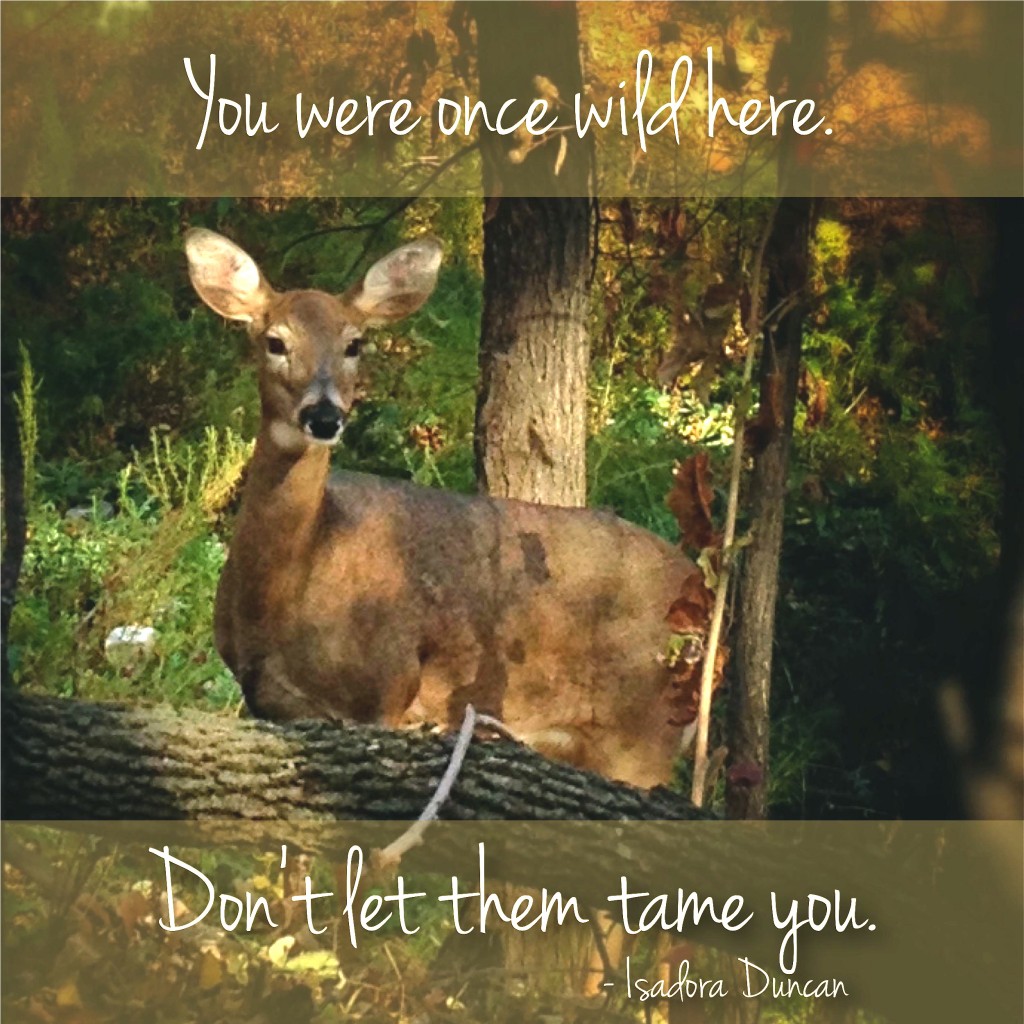 I have seen too many wounded women.
I have seen too many wounded women.
I have watched them lose the light in their eyes when the shadows overcame them.
I have heard a thousand reasons why they no longer give themselves permission to live truthfully.
I have seen too many wild hearts tamed.
I have witnessed the loss of courage when it’s just too hard to keep being an edgewalker in a world that values conformists.
I’ve recognized the fear as they take tiny brave steps, hoping and praying the direction is right.
“I feel guilty whenever I indulge in my passions. It feels selfish and irresponsible.”
“My husband doesn’t like it when I talk about feminine wisdom, so I keep it to myself.”
“If I write the things that are burning in my heart, it will freak people out. So I remain silent.”
“I used to love wandering in the woods, but I never have time for it anymore.”
“I just want to have a real conversation for a change. I want to feel safe to speak my heart.”
“My job makes me feel dead inside, but I don’t know what else I can do.”
“People expect me to be strong and hide my feelings now that I’m in leadership. I feel like I have too much bottled up inside that I can’t share with anyone.”
“Sometimes I think there must be something wrong with me. I just don’t fit in.”
“There is so much longing in the world. I get lost in that longing and don’t know how to sit with it.”
“I wanted to be a painter, but I needed a real career. I haven’t painted in years.”
“People think I’m strange when I share my ideas, so I’ve learned to keep them to myself.”
“I can’t go to church anymore. I don’t feel understood there. But I haven’t found another place where I can find community, so I often feel lonely.”
“There’s a restless energy inside me that wants to be free. I long to be free.”
So much woundedness has been laid tenderly on the ground at my feet.
So many women want their stories validated. Their fears held gently. Their tiny bits of courage honoured.
I hear them whisper “please hear me” through clenched teeth.
I see the tears threaten to overflow out of stoic eyes.
I recognize the longing.
I know the brokenness.
I feel the ache of silenced dreams.
They come to me because they know I have been broken too.
They trust me with their whispers because I am acquainted with fear.
They look to me for courage and understanding because they witness my own long and painful journey back to my wild heart.
I see you.
I know you.
I honour you.
I love you.
You are beautiful.
You are courageous.
You are okay.
You can be wild again.
You can trust your heart. She will not lie to you.
You can live more fully in your body. She will welcome you back.
You can go home to that part of you that feels like it’s been lost.
You can find a circle of people who will understand you.
You can step back into courage.
You have permission to be an edgewalker.
You have permission to speak the things that you’re longing to say.
You have permission to be truly yourself.
You have permission to step away from your responsibilities for awhile.
You have permission to wander in the woods.
You also have permission to be afraid.
And to wait for the right time.
And to sit quietly while you build up your courage.
You don’t need to do this all alone.
And you don’t need to do it all at once.
You don’t need to shout before you’re ready to whisper.
You don’t need to dance before you’ve tried simply swaying to the music.
You can give your woundedness time to heal.
Take a small step back into your self.
Move a little closer to your wild heart.
Pause and touch the wounded places in you.
Just breathe… slowly and deeply.
And when you’re ready, we can do this together.
If this post resonates, please consider the following:
1. Join me as I host a circle of amazing women at A Day Retreat for Women of Courage in Winnipeg on October 20th. Pay what you can.
2. I’m creating a new online program called Lead with Your Wild Heart (related to the themes in this post) that feels like a coming together of a thousand ideas that have filled my head in recent years. Add your name to my email list (top right) to be the first to hear about it and to receive a discount.
by Heather Plett | Sep 24, 2012 | journey, practice

Yesterday, Ronna Detrick and I (and the women who’d gathered in circle with us) had a heart-opening conversation about pilgrimage, community, story-telling, and feminine spirituality. (You can listen to the recording here.) I love having conversations like this because, even if I’m the one doing the teaching, I always end up walking away with more clarity than I had before.
At the end of the call, after I’d shared several stories of the “hardships, darkness, and peril” along my own pilgrimage, Ronna asked me to talk about how I hang onto hope in the middle of the dark times.
It’s a timely question for me, and it’s been on my mind since our conversation. As much for myself as for you, the following are some reminders of how to reach for hope when life knocks us off our feet.
1.) Find community. I can’t stress this strongly enough. You NEED community. You need a circle of people who will support you and who won’t judge you when you’re falling apart. You need to let yourself be held when you’re not feeling strong enough to walk on your own. There is no weakness in admitting that you need other people.
2.) Find wild spaces to wander in. When I’m falling apart and hardly know how to articulate the depths of the pain, I head to the woods or the riverbank. I find the Goddess there, in the most unexpected ways – in the wind, in the waves on the river, in the twinkling light reflected off the water, in the eyes of the deer who stands and stares at me. I think the Goddess is especially comfortable showing up in wild spaces because she has a wild heart herself. I feel comforted and more alive when I step out of the woods and return to my hope.
3.) Rest. It’s always important to rest, but when you’re going through especially difficult times, you need to find even more rest than usual. Deep, soulful rest that replenishes your strength. Take naps and hot baths, curl up with a good book, let people do some of your chores for you – just rest.
4.) Give yourself permission to cry. A social worker once told me that tears are the window-washers of the soul. It might sound a little corny, but it’s true. The tears help clean us and they help improve our vision. Let those deep sobs erupt from your belly and don’t try to keep them inside. Tears held in for too long will drown you.
5.) Find spiritual practices that sustain you. I’ve said this many times and I’ll say it again – spiritual practices are especially necessary when your pilgrimage gets difficult. Your spiritual practice can be as unique as you are – dancing, singing, walking, painting, praying, meditating, yoga, or photography. These practices shift us out of our left-brain thought processes that want to fix our problems or find logic in them or rush through them to the next easy place on the journey. Inside the practice, we rest in the unknowing space, where the problems serve as our teachers rather than our adversaries.
by Heather Plett | Sep 13, 2012 | Compassion
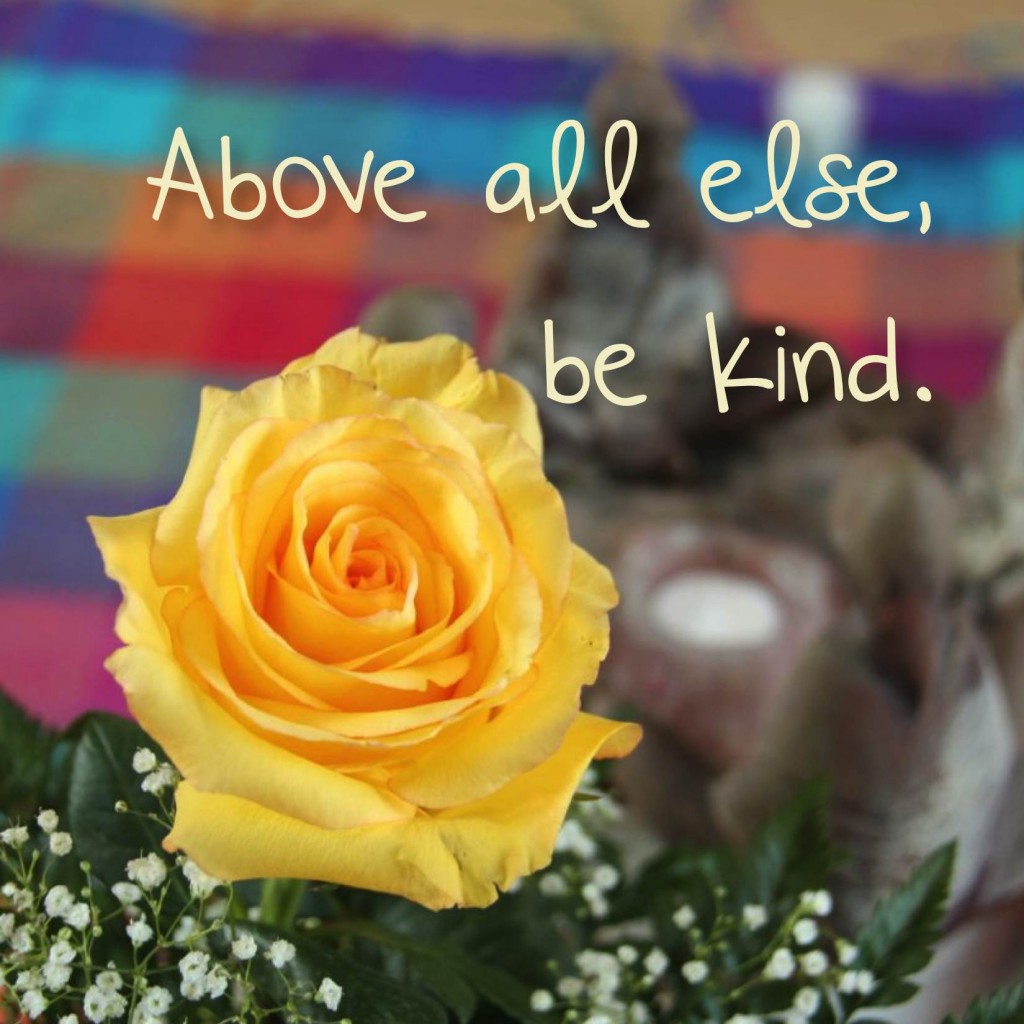
I have been the recipient of a great deal of compassion lately – openhearted, open-armed, soul-enriching compassion. I am deeply blessed.
It brings to mind the simple words my Dad used to say almost every time we left the house. “Be kind,” he said, and we knew that if we did nothing else but offer someone kindness that day, then we had been successful in Dad’s eyes.
There have been a LOT of successful people in my life lately.
Not only have I been comforted and encouraged by kindness, I have been educated by it. Here are my thoughts, based on what I’ve witnessed, about how to offer compassion to people you care about who are going through tough times.
1. Create safety. The most important thing you can do is offer the person a safe place to fall apart. Be trustworthy, be present, be available, and be soft. Give them the warmth of your touch, the comfort of your words, and the gift of your listening.
2. Refrain from offering advice until you know they’re strong enough to receive it (and/or they’ve asked for it). When a person is feeling vulnerable and broken, unsolicited advice can make them feel like they’ve failed or they’re not as good as you are at handling difficult times. Your advice may be valuable, but don’t offer it if it will make them feel small.
3. Withhold judgement. Nobody who’s going through a difficult journey wants to be judged for their weakness, their tears, their messy home, or their indecisiveness. Bite your tongue even if you think they’re being foolish or immature. Let them be weak if they need to be weak. There will be time for strength later.
4. Be an active listener. Let the person suffering do most of the talking and be fully present for what they are saying. In the middle of the struggle, there is nothing quite as powerful as knowing that you are heard and seen. Don’t try to fill the silences with platitudes or solutions. Leave as much space as they need to share their stories and work through what they need someone to hear.
5. Offer empathy, not sympathy. Empathy lets a person know they’re not alone, sympathy leaves them feeling inferior. Empathy builds bridges, sympathy builds walls. People who offer sympathy (eg. “poor you”) instead of empathy are usually doing it because they feel some need to elevate themselves above the other person.
6. Share your stories to make them feel less alone, but don’t overshadow their stories. Stories are really important in times of grief or stress, but the most important stories that need to be shared at that time are the ones that belong to the person going through the trouble. Offer your own stories in a respectable manner, but only after they’ve had a chance to share theirs.
7. Do not pretend to know EXACTLY what they’re going through. You can’t possibly know just what they’re experiencing because you are a different person carrying different baggage. You may have been on a similar path and felt similar pain (and that’s worth sharing), but each person’s path is his/her own. Let them describe what they’re going through rather than assuming you know.
8. Let them cry. Cry with them if that is what emerges. Don’t try to end their grief or fix their pain. Sit with them in the middle of that field of grief and just let what is be what it needs to be. Nobody can take a shortcut through pain, so don’t pretend you’ve found one. Watching a loved one cry feels excruciating, and you really, really want to fix it for them, but to show them the kind of love they need, you need to let the tears flow and simply bear witness.
9. Let them know that they are courageous, even if their courage only shows up in very small ways. When the road is hard, just putting one foot in front of another takes courage. Sometimes getting out of bed in the morning takes courage. Help them discover their own basketful of courage stories – memories of the times when they have shown courage that will help them rise to the challenges ahead.
10. Just love them. Plain and simple. Bring them supper, buy them chai latte, babysit their kids, take them out to a movie, show up to help them serve the food at the funeral they’ve been dreading, sit with them at the hospital, buy them toilet paper when you’re sure they haven’t had a moment to go shopping, drop love notes in their mailbox… do whatever it takes to let them know they are surrounded by love.






